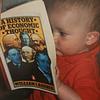You need to sign in or sign up before continuing.
Take a photo of a barcode or cover
107 reviews for:
Enquiries Concerning the Human Understanding: And Concerning the Principles of Morals
David Hume
107 reviews for:
Enquiries Concerning the Human Understanding: And Concerning the Principles of Morals
David Hume
challenging
informative
reflective
slow-paced
im definitely not going to retain all of this info but very interesting ideas
David Hume (1711-1776) was the most famous Scottish philosopher of the Scottish Enlightenment and one of the greatest thinkers of all time. He wrote An Enquiry Concerning Human Understanding in 1774. This was actually a simplified, more easy to understand version of his famous work, A Treatise of Human Nature . An Enquiry Concerning Human Understanding was more accessible to people of the day and is also for us modern folks.
Hume addresses a number of subjects in this book. Particularly interesting to me were his examination of the reason of animals, and criticism of religion and validity of miracles. He touches on a wide variety of philosophical subjects including free will, how thoughts associate and flow, probability, and he ends with a really interesting three part examination of skeptical arguments. Like Thomas Paine, he was ahead of his time and through his writings encouraged people to reject dogma and adopt science and reason.
I visited his mausoleum in Edinburgh in 2018 and my wife and I always stop by and say hello to his statue on the Royal Mile, just down the hill from Edinburgh Castle. He's one of my freethinker heroes.


Hume addresses a number of subjects in this book. Particularly interesting to me were his examination of the reason of animals, and criticism of religion and validity of miracles. He touches on a wide variety of philosophical subjects including free will, how thoughts associate and flow, probability, and he ends with a really interesting three part examination of skeptical arguments. Like Thomas Paine, he was ahead of his time and through his writings encouraged people to reject dogma and adopt science and reason.
I visited his mausoleum in Edinburgh in 2018 and my wife and I always stop by and say hello to his statue on the Royal Mile, just down the hill from Edinburgh Castle. He's one of my freethinker heroes.


challenging
informative
slow-paced
Very interesting to see how Hume develops his empiricism entirely contrary to Descartes &c rationalism. When both of them set out their arguments and lines of reasonings it seems perfectly sound yet the theories are perfectly antithetical to each other. I am looking forward to see how Kant will reconcile the two strands.
I read this kinda on accident. I thought this was the guy who wrote Leviathan. But no, I mixed up Hume and Hobbes. Oh well, I enjoyed this one. I think it was the most challenging philosophy book I've read so far, as far as comprehension goes. I understood most of it, but it required more attention than I usually need to read a book.
Hume is concise and efficient. This book is pretty short; it gets its point across and then ends. He addresses a question that really bothered me in my early twenties, but I'd pushed the thought out of my mind.
Why do we think we know anything about the world around us? That's the central question. He argues that everything we know is from experience. How do we know a rubber ball will bounce? Does it have some inherent property of bounciness? You could study a rubber ball as long as you like, but if you've never seen one before and no one has told you about one, you have no idea what it'll do until it does it. We know things about the external world based on cause and effect. We see one event conjoined with another enough times and we assume they are connected. We have no reason to assume they will continue to be connected, but we do. It's natural, and that's okay. I thought it was foolish to believe anything about the external world because there is no way to reason yourself into believing it. Hume argues that we have no other choice, so we gotta do it. It was a freeing idea for me.
Feeling trapped in this nonrational world I'd reasoned myself into, I was naturally drawn to math, where we can have certainty. Hume makes a similar distinction. There are things we know by matter of fact (the external world) and things we know by relation of ideas (basically just math haha). I appreciated his acknowledgement of math in this way. With math, we can relate ideas with certainty (the equals sign is the most common way it's done) without the need of an experiment.
I expected him to take a stand on religion in some way. I couldn't tell his position on religion until near the end of the book. He argues that religion is a matter of faith, not a matter of reason or fact. In his view, if you think you're making an argument for the existence of God, you're deceiving yourself. He never disparages faith; he just points out that it's incompatible with reason and experience.
I did start to burn out near the end. Maybe I should have read it a little slower than I did, but that's okay. I'll come back for a reread at some point.
His final line is kinda funny:
"When we run over libraries, persuaded of these principles, what
havoc must we make? If we take in our hand any volume; of divinity or
school metaphysics, for instance; let us ask, Does it contain any abstract reasoning concerning quantity or number? No. Does it contain any experimental reasoning concerning matter of fact and existence? No. Commit it then to the flames: for it can contain nothing but sophistry and illusion."
To clarify, I don't think he means we should burn books that have no scientific value, but that we should burn the ones that pretend to be of scientific value.
Hume is concise and efficient. This book is pretty short; it gets its point across and then ends. He addresses a question that really bothered me in my early twenties, but I'd pushed the thought out of my mind.
Why do we think we know anything about the world around us? That's the central question. He argues that everything we know is from experience. How do we know a rubber ball will bounce? Does it have some inherent property of bounciness? You could study a rubber ball as long as you like, but if you've never seen one before and no one has told you about one, you have no idea what it'll do until it does it. We know things about the external world based on cause and effect. We see one event conjoined with another enough times and we assume they are connected. We have no reason to assume they will continue to be connected, but we do. It's natural, and that's okay. I thought it was foolish to believe anything about the external world because there is no way to reason yourself into believing it. Hume argues that we have no other choice, so we gotta do it. It was a freeing idea for me.
Feeling trapped in this nonrational world I'd reasoned myself into, I was naturally drawn to math, where we can have certainty. Hume makes a similar distinction. There are things we know by matter of fact (the external world) and things we know by relation of ideas (basically just math haha). I appreciated his acknowledgement of math in this way. With math, we can relate ideas with certainty (the equals sign is the most common way it's done) without the need of an experiment.
I expected him to take a stand on religion in some way. I couldn't tell his position on religion until near the end of the book. He argues that religion is a matter of faith, not a matter of reason or fact. In his view, if you think you're making an argument for the existence of God, you're deceiving yourself. He never disparages faith; he just points out that it's incompatible with reason and experience.
I did start to burn out near the end. Maybe I should have read it a little slower than I did, but that's okay. I'll come back for a reread at some point.
His final line is kinda funny:
"When we run over libraries, persuaded of these principles, what
havoc must we make? If we take in our hand any volume; of divinity or
school metaphysics, for instance; let us ask, Does it contain any abstract reasoning concerning quantity or number? No. Does it contain any experimental reasoning concerning matter of fact and existence? No. Commit it then to the flames: for it can contain nothing but sophistry and illusion."
To clarify, I don't think he means we should burn books that have no scientific value, but that we should burn the ones that pretend to be of scientific value.
challenging
informative
inspiring
reflective
fast-paced
First things first: Hume needs an editor. Specifically one who hates commas. Hume's ideas are not hard to understand, and, even though the language is quite stilted and formal, his train of thought is generally easy to follow. However, this book was incredibly difficult to read because of sentences like this:
We shall make trial of this, with regard to the hypothesis, by which we have, in the foregoing discourse, endeavoured to account for all experimental reasonings; and it is hoped, that this new point of view will serve to confirm all our former observations.
Got tired just typing that. WHY. Did Hume dictate the book and some idiot transcribing it put in random commas whenever he paused? It is exhausting reading sentences split with five or more commas. It brakes your reading to such an extent that you forget the start of the sentence long before reaching the end.
Aside from the comma abuse, it was a pretty good read. Hume's 'correlation doesn't imply causality' thing is always interesting. Made me miss being a student though, because when one reads for a purpose (writing an essay or studying for a test) you make notes and summarise and generally make more of an effort to understand and remember. I felt this didn't settle as deeply as it could have.
But I choose to blame the commas.
We shall make trial of this, with regard to the hypothesis, by which we have, in the foregoing discourse, endeavoured to account for all experimental reasonings; and it is hoped, that this new point of view will serve to confirm all our former observations.
Got tired just typing that. WHY. Did Hume dictate the book and some idiot transcribing it put in random commas whenever he paused? It is exhausting reading sentences split with five or more commas. It brakes your reading to such an extent that you forget the start of the sentence long before reaching the end.
Aside from the comma abuse, it was a pretty good read. Hume's 'correlation doesn't imply causality' thing is always interesting. Made me miss being a student though, because when one reads for a purpose (writing an essay or studying for a test) you make notes and summarise and generally make more of an effort to understand and remember. I felt this didn't settle as deeply as it could have.
But I choose to blame the commas.
God, this was hard to read. Should have expected that from an enlightenment era philosophy book, but seriously, I don't think I've ever read anything this dense. It's definitely not helped by the content, at times. While it's interesting to read early atheist thinkers, especially given how hesitant Hume is about being explicit in his atheism for safety reasons, sentiments such as (paraphrasing) "If God was real then women would be just as smart as men. Since women are fundamentally irrational, God must be a human invention" don't exactly give credence to anything else Hume says. Politics aren't generally all that important to me when reading something so very old. Here they just combined with the density to make it a nightmare to actually read. Still, three stars for the comprehensive notes and compilation of additional texts, and for the interesting arguments about the nature of knowledge.
Somwhere in this book Hume reminds us to "Be a philosopher; but, amidst all your philosophy, be still a man" - it is a kind of thing you would say to a philospher rather than hear from same. Hume does maintain on this principle and while he is not afraid of going into abstract reasonings and doubts for mere pleasure of doing so; he is always willing, rather he insists we keep coming back to our daily life to check validity of our conclusions.
He goes on to prove that all our knowledge is derived from experience and that no associations among experienced elements (for example, cause and effect) can thus be surely derived on different elements. Then he says it is done by all animals on impulse and life will not be possible otherwise. He is not blind to fact that we, in daily life, propotion our faith in these associations to probability.
He presents a wonderful arguement against miracles continuing on same line of reasoning. He argues that all miracles seemed to have happened in long past and always in most barbarian circumstances. It is more probable (and thus easier to believe) that a testinomy telling us of occurance of a highly improbable, almost impossible event (which all miracles are by very defination) should be false (innocently or otherwise)
He is greatly economical with words and conjust a lot in those hundred odd pages. The language is beautiful and thoughts contained them of great value. Despite the wisdom, he is humble, like Socrats, and desires to be told where he is in error. In fact, a couple of times he mentions the possibility that there may be some points he hadn't considered in some particular subject. Neither does he prerend to have established a perfect system of thought.
He goes on to prove that all our knowledge is derived from experience and that no associations among experienced elements (for example, cause and effect) can thus be surely derived on different elements. Then he says it is done by all animals on impulse and life will not be possible otherwise. He is not blind to fact that we, in daily life, propotion our faith in these associations to probability.
He presents a wonderful arguement against miracles continuing on same line of reasoning. He argues that all miracles seemed to have happened in long past and always in most barbarian circumstances. It is more probable (and thus easier to believe) that a testinomy telling us of occurance of a highly improbable, almost impossible event (which all miracles are by very defination) should be false (innocently or otherwise)
He is greatly economical with words and conjust a lot in those hundred odd pages. The language is beautiful and thoughts contained them of great value. Despite the wisdom, he is humble, like Socrats, and desires to be told where he is in error. In fact, a couple of times he mentions the possibility that there may be some points he hadn't considered in some particular subject. Neither does he prerend to have established a perfect system of thought.
reflective
medium-paced
Great writer, terrible philosopher, and a lot of assumptions and false attributions to religious people. Still a fun read
challenging
informative
reflective
slow-paced
"Animals, therefore, are not guided in these inferences by reasoning: Neither are children: Neither are the generality of mankind, in their ordinary actions and conclusions: Neither are philosophers themselves, who, in all the active parts of life, are, in the main, the same with the vulgar, and are governed by the same maxims. Nature must have provided some other principle, of more ready, and more general use and application; nor can an operation of such immense consequence in life, as that of inferring effects from causes, be trusted to the uncertain process of reasoning and argumentation" (94, 9:5).





